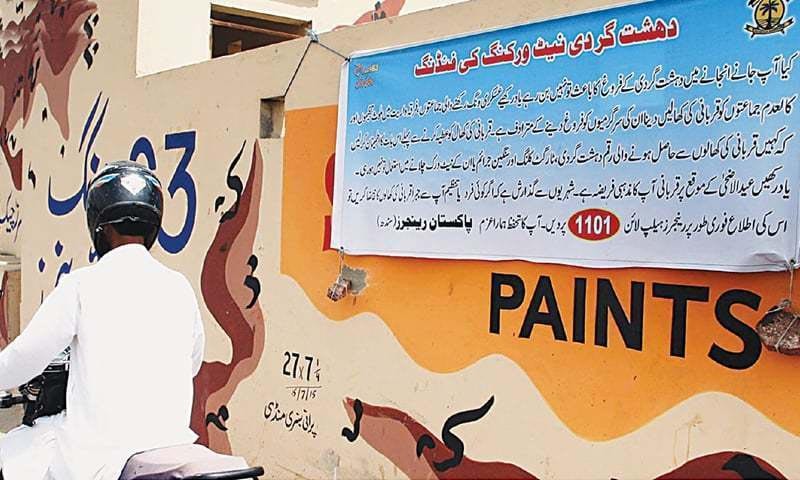
A code of conduct issued by the administration -- to stop suspected groups from raising funds through selling hides that could be spent on terrorism -- has worked in the last couple of years in Karachi

Mufti Bashir, a religious teacher associated with one of Karachi’s prestigious madrassas (seminaries), has been collecting the hides of sacrificial animal from donors on three days of Eid ul Azha for the past ten years. Eid ul Azha is Muslims’ second biggest religious festival when they sacrifice animals to please their God and donate the hides to charity.
Religious and social charities, religious parties, seminaries and outlawed militant groups compete vigorously for the hides, which has turned into a billion rupees business.
In the past, Bashir has never got into any trouble in collecting the hides after easily getting an official permission from the district administration. This year, however, the situation has changed to a great extent. "The district administration has not been giving the permission to collect hides, even after submitting a number of documents," Bashir tells TNS. "The law enforcement agencies have even picked up two of our colleagues, who were putting up banners appealing the residents to donate the hides, and released them after four hours following an interrogation."
Last year and even this year, most neighbourhoods in Karachi have been missing the sight of men belonging to various religious parties, proscribed jihadi groups with new names, seminaries and political parties literally camping out on the streets through the three days of Eid, appealing to people donate animal hides to their mission, thanks to the tough stance taken by the government.
This year, again, the federal government has banned 65 proscribed outfits listed by the National Counter Terrorism Authority from collecting animal hides and donations ahead of Eid ul Azha. These include Lashkar-e-Jhangvi, the Jaish-e-Muhammad, the Tehreek-e-Taliban Pakistan, the Ahle Sunant Wal Jammat, the Hibzut Tehrir and Lashkar-e-Tayyaba. However, according to the list, the Jamaat ud Dawa (JuD) and its charity front the Falah-e-Insaniyat Foundation (FIF), which has been campaigning for hide collection, are not in the list of proscribed outfits. However, they are on the National Counter Terrorism Authority’s (NACTA) watch list.
Acting upon the directives of federal government, commissioners of the cities have drawn up code of conducts for the collection of animal hides. "Only charity organisations and those who signed the code of conduct were allowed to collect animal hides. A ban was imposed on the use of loud-speakers, banners, posters and camping in streets to collect animal hides. According to the code of conduct, carrying arms, ammunitions and batons were also banned on the three days of Eid," says Farhan Ghani, Additional Commissioner of Karachi.
Analysts praise the authorities for issuing a code of conduct for hides’ collection. Abubakkar Yousafzai, a Karachi-based activist working on safe charity, says that the main reason behind issuing a code of conduct was to stop suspected groups from raising funds through selling hides that could be spent on terrorism in the city and other parts of the country. "Donations during religious festivals, such as Eid ul Azha, can reap millions of rupees for banned terrorist outfits, dodging the law enforcers by taking on new names," Yousafzai tells TNS. "The public needs to be aware of where its money is going and what group it is giving to."
Intelligence agencies investigating the collection of animal hides on Eid ul Azha have linked money-laundering to proscribed militant groups. It is the reason that paramilitary Rangers have put up banners across Karachi informing the residents not to donate hides of sacrificing animals to such groups. On last Eid ul Azha, Rangers arrested 356 people on Eid for violating the code of conduct, confiscating 18,000 animal hides. A press release from Rangers said 36 of the people arrested were being interrogated for involvement in serious crimes. The paramilitary force also named political, religious and banned jihadi organisations including the Mutahidda Qaumi Movement, the Jammat-e-Islami, Sunni Tehreek, Jamaatud Dawa, Ahle Sunnat Wal Jamaat and Dawat-e-Islami for violating the code of conduct.
Hide collection is a lucrative business worth millions of rupees across the country, especially in Karachi alone where over one million hides are collected every year. Activists of political parties and religious groups, including proscribed militant groups, used to invest heavily in the visibility campaigns aimed at securing the maximum number of hides. The Edhi Foundation, a prominent charity, is the first organisation that started collecting the animal hides in 1949 to support their welfare work. Among the political parties, the Jamaat-e-Islami is the first one, which has been running skins collection campaign since 1950s.
Until the start of Rangers-led operation in the Karachi in September 2013, the three days of Eid were considered critical days in the politically volatile city, where organisations with conflicting agendas would clash in their pursuit for collecting hides and, in some cases, caused killing of people. However, the clashes for hides’ collection have been controlled to great extent in the past four years.
"A war for animal’s skins was not strange in Karachi, where constant fighting for territorial control, land grabs and extortions were common," says a senior law enforcement official. "Unlike the past years, there were hardly any reported incident of snatching of violence which had become characteristic of the occasion."
The MQM has also been collecting hides to support their charity front Khimdat-e-Khalq Foundation for the past three decades and winning the annual major share of hides collection in the metropolis. But since the last Eid, the political party, reeling from ongoing crackdown, has not been collecting the skins. Law enforcement agencies had blamed the party for forcibly collecting hides and using the earned money in subversive activities.